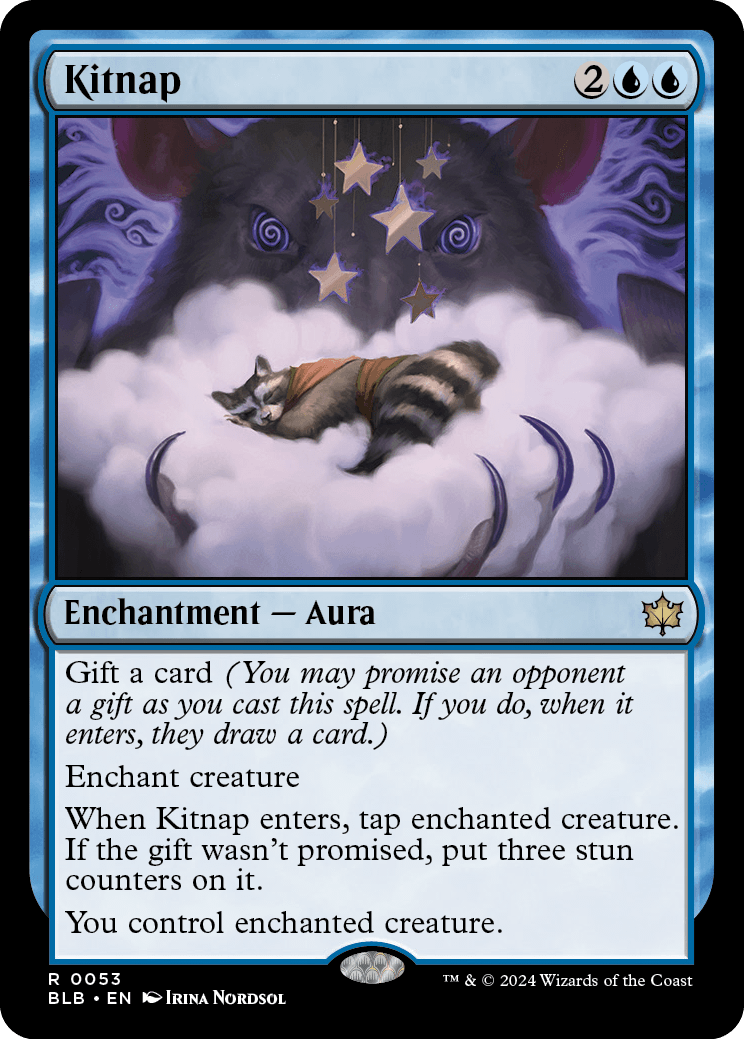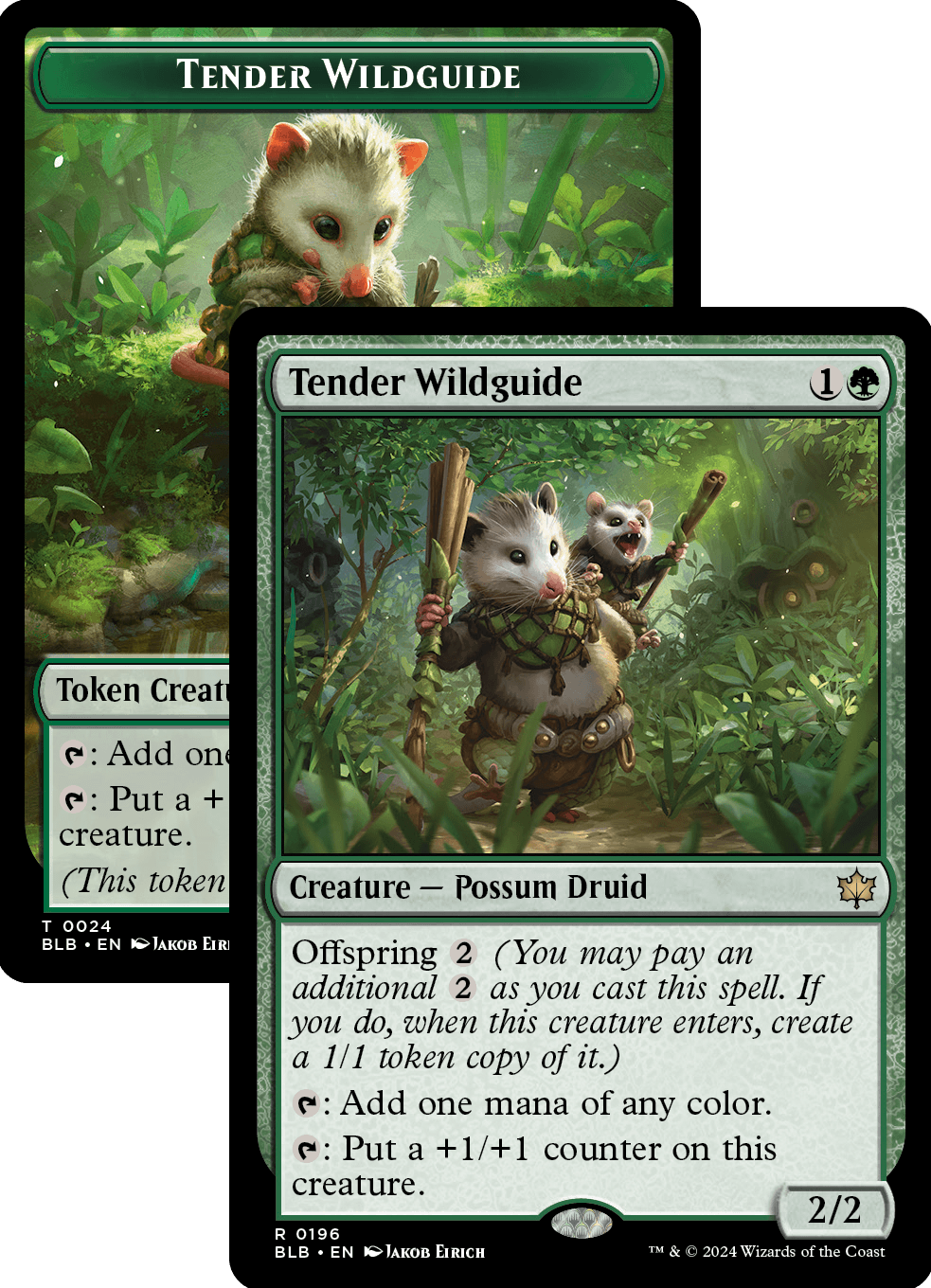Bloomburrow is here, which means it’s time once more for the Missed Triggers Guide to spring into action! We’ve searched Valley high and low for any triggered abilities that may cause issues for players and judges alike. Check out our list of Warnings, special remedies, tips on evaluating triggers, and more to make sure you’re prepared this Standard season!
Six cards have one or more triggers that upgrade to a Warning when missed:
“[create a token]. Exile that token at the beginning of the next end step.”
The same effect that’s creating a token here also creates a delayed trigger to “clean up” that token later in the turn. Since this trigger is undoing a zone change, it cannot be missed entirely; no matter how many turns pass before the error is noticed, the remedy will include resolving that trigger, with the opponent choosing between resolving it immediately or at the start of the next phase.
“At the beginning of your upkeep, return another creature you control to its owner’s hand. If you do, .… Otherwise, you may return Mistbreath Elder to its owner’s hand.”
Similar to gems like Greenbelt Rampager, Charnel Troll, and Acererak the Archlich, Mistbreath Elder is an undercosted attacker that comes with a downside; every turn, its trigger eats up a bit of tempo or resources. This card does shake things up a bit since it can stick around on the battlefield whether the cost is paid or not! But that isn’t enough to change its evaluation. Controlling more creatures will almost always be better than controlling one creature that’s bigger, so forcing its controller to return creatures to their hand makes this Frog’s trigger generally detrimental.
“When Colossification enters, tap enchanted creature.”
Starter Kits for Bloomburrow include this throwback to Ikoria, making it legal for Standard. Sadly, this MONSTROUS boost to power and toughness comes with a drawback. Since the “enters” trigger of this Aura visibly affects its enchanted object, the remedy if it’s missed is to resolve that trigger immediately – tapping the enchanted creature – as soon as the error is caught.

4. Kitnap
“When Kitnap enters, tap enchanted creature.”
Just like with Colossification, this “enters” trigger affects the enchanted object and nothing else. The remedy when it’s missed is to resolve the trigger as soon as the error is caught, tapping the creature and giving it stun counters if the gift wasn’t promised. Speaking of which…
4 – 6. Permanent spells with Gift: Kitnap (again), Scrapshooter, and Starforged Sword
“You may promise an opponent a gift as you cast this spell. If you do, when it enters, they [receive that gift].”
The new “gift” keyword behaves differently when it’s printed on an instant or sorcery versus when it’s on a permanent spell. For instants and sorceries, giving a gift is just part of the spell’s instructions. Forgetting a gift means the spell was resolved incorrectly, and both players share the responsibility (and the Warning for Game Rules Violation) if this error isn’t caught in time.
However, permanent spells give their gifts as a trigger when that card enters, rather than an instruction as it resolves. That means players can miss this trigger. And since gifts almost always benefit the opponent, players who forget their promises for these three listed cards will receive a Warning. If a full turn has passed since the trigger was missed, the game continues with no remedy, but if it hasn’t then the opponent can choose to add their gift to the stack or ignore it.
Four notable cards have a trigger that does NOT upgrade when missed:
1. Parting Gust
“[exile target nontoken creature]. If the gift wasn’t promised, return that creature to the battlefield under its owner’s control with a +1/+1 counter on it at the beginning of the next end step.”
“Delayed Flicker” effects like this – cards that send any player’s creature on an Otherworldly Journey and bring it back later – typically don’t meet the high bar to be generally detrimental. Players are incentivized to use these effects to get bonus “enters” triggers or rescue their own creatures from a nasty combat as often as they use them to temporarily remove an opponent’s blocker. Parting Gust’s gift makes this even clearer, since the card will usually be upgraded to a permanent exile when it’s pointed at an opponent’s creature.
Players who miss this trigger won’t receive a Warning when their error is noticed, and the exiled creature is guaranteed to return no matter how many turns have passed since the trigger was missed.
“When Daggerfang Duo enters, you may mill two cards.”
Self-mill triggers have long plagued judges and players with confusing rulings. The decks that include these cards usually benefit from having more cards in the graveyard. But if the same card that mills isn’t also generating value based on the graveyard, then technically, the trigger just brings the player closer to running out of cards in their deck.
Here we have a solution: if a player thinks that milling cards will hurt their chances of winning, they can choose to do nothing as the trigger resolves! Players don’t have to acknowledge a trigger if it has no impact on the game, so there’s no infraction if a player doesn’t mill for their Daggerfang Duo’s trigger.
“At the beginning of your upkeep, reveal the top card of your library and put that card into your hand. You lose life equal to its mana value.”
The life lost for this trigger is usually well worth the card gained, making this a trigger that players typically want to remember. Judges should carefully investigate cases where missing this trigger seems unusually beneficial to its controller, but genuine mistakes with this card should never be upgraded to a Warning.
“When Sunspine Lynx enters, it deals damage to each player equal to the number of nonbasic lands that player controls.”
This trigger deals damage to every player at the same time, with no obvious upside built in. But it may surprise you that this does not make it “generally detrimental”!
When a card negatively impacts everyone, usually, that card’s controller will be in the best position to take advantage of the aftermath. Having a 5/4 creature to attack with after weakening the opponent and shutting down any life gain is a strong position for an aggressive deck. And the Lynx’s owner can limit the damage they take by (1) deciding when in the game they cast the card, and (2) limiting the number of nonbasic lands in their deck in the first place. Since they have far more control over the outcome of this trigger than their opponents do, we assume this trigger’s controller usually wants to remember it, so there’s no Warning if they miss it.
Other notable cards and mechanics:

1. Creatures with Offspring
“You may pay [an additional cost] as you cast this spell. If you do, when this creature enters, create a 1/1 token copy of it.”
The worst part of “bring your offspring to the battlefield” day is forgetting to bring them! Since creating an offspring token is an “enters” trigger of the creature card, it is technically a missable trigger, even if the player announced the additional cost as they paid it. Players who forget to point out the trigger (or create a token) after their creature enters have missed the opportunity once they take any subsequent “sorcery speed” action.
And remember: opponents are NOT obligated to remind a player about their offspring tokens!
2. Salvation Swan and Skyskipper Duo
“[exile up to one other target creature you control]. Return it to the battlefield … under its owner’s control at the beginning of the next end step.”
Both of these cards have delayed triggers that undo a zone change. Since they can only target other creatures under the same player’s control, they should be positive in just about every case. That means there’s no upgrade to a Warning – judges should simply apply the remedy once the error is brought to their attention, returning the exiled card either immediately or just after the next phase starts.
“When Charmed Sleep enters, tap enchanted creature.”
As with Colossification and Kitnap and that appeared earlier in this article, this trigger affects only the enchanted object, so it cannot be permanently missed. If the Aura’s controller forgets to tap the enchanted creature immediately, they’ll do so as soon as the error is caught. Charmed Sleep is also a Starter Kit exclusive – meaning it and Colossification won’t appear in any Sealed Deck or Booster Draft events, but might pop up in Standard events, so keep your eyes peeled!
Thank you for settling in with us and this article! With this, we hope you’re feeling better prepared to face any tricky triggers you’ll find in Bloomburrow. Next, we’re looking forward to the release of Duskmourn: House of Horror, which is creeping up quickly! We hope to see you back for that guide once it’s arrived!
